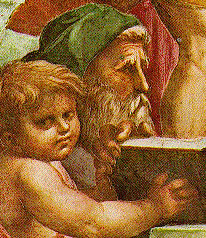
Raphael, "School of Athens" (Detail of Zeno) 1511
Vatican Palace, Rome

Raphael, "School of Athens" (Detail of Zeno) 1511
Vatican Palace, Rome
It is fair to describe Stoicism as the most influential ethical doctrine
of the ancient Western world before Cbristianity. It swept over
Greece after the fall of Alexander, and dominated Roman thought
until it was superseded by Christianity. But unlike Hedonism and
Cynicism which remained more or less unchanged from their start,
Stoicism went through a number of radical developments in its
long history.
Stoicism began as a development of Cynicism, and ended as a
form of Platonic idealism. Most of the changes which happened,
however, were in the metaphysical views oef the Stoics, and in
their logic. Their ethical views remained much the same, and
consequently in this section since we are concerned with ethics,
we can ignore the minor variations which took place in Stoic
moral theory and treat the doctrine as if it had not altered.
The founder of Stoicism was named Zeno (not Zeno of Elea,
the originator of the famous logical paradoxes). Zeno is supposed
to have lectured in the 3rd. century B.C. from a porch. Stoicism
gets its name from this fact ('stoa' is Greek for 'porch').
Like the Cynics, the Stoics were very depressed by the
collapse of the Greek city states and the Alexandrian Empire.
They felt there was no hope for social reconstruction.
Consequently their philosophy consists ofadvice to individual
people for attaining personal salvation in a 'crumbling world'.
Although Stoicism is a fairly complex moral theory, its basic ideas
for achieving personal salvation is very like that of the Cynics and
can be stated in one sentence :
Learn to be indifferent to external influences !
Epictetus, who began life as a Roman slave, and who rose to be
an official in the Roman government, was one of the most famous
and influential of the Stoics. In his famous discourse on
'Progress or Improvement', he tells us why we must learn to
cultivate a philosophy of indifference :
'Where then is progress? If any of you, withdrawing himself from
the externals, turns to his own will to exercise it and to improve it
by labour, so as to make it conformable to nature, elevated, free
unrestrained, unimpeded, faithful, modest; and if he has learned
that he who desires or avoids the things which are not in his power
can neither be faithful nor free, but of necessity he must change
with them and be tossed about with them as in a tempest, and of
necessity must subject himself to others who have the power to
procure or prevent what he desires or would avoid; finally, when
he rises in the morning, if he observes and keeps these rules,
bathes as a man of fidelity, eats as a modest man; in like manner,
if in very matter that occurs he works out his chief principles as
the runner does with reference to running; and the trainer of the
voice with reference to the voice - this is the man who truly makes
progress, and this is the man who has not travelled in vain. But if
he has ,trained his efforts to the practice of reading books, and
labours only at this, and has travelled for this, I tell him to return
home immediately, and not to neglect his affairs there; for this for
which he has travelled is nothing. But the other thing is
something, to study how a man can rid his life of lamentation
and groaning, and saying, Woe to me.'
As can be inferred from the above quotation, the Stoics believed
that good or evil depends upon oneself. Other people may have
power over external matters that affect us - they can put us in prison
and torture us, or they can make a slave of us: but none the less if we
can be indifferent to these events, others will not in a significant
sense have power over us. Epictetus expressed this by saying that
virtue resides in the will - that only the will is good or bad. If we
have a good will (and we can have one by remaining indifferent to
external happenings), our essential character cannot be destroyed
by the external events in his life. When a man is indifferent to such
happenings he is a free man. He is no longer bound by adherence to
events outside of himself. By practising indifference he becomes
independent of the world -and thus, even though the world may be in
chaos, this will not prevent him from achieving personal salvation.
The ethical views of the Stoics cannot be fully understood apart
from their metaphysics. They believed in predestination, i.e.,
that all happenings in the world are fixed by God according to
a preconceived plan. Nothing happens fortuitously. Virtue
consists in a will which is in agreement with the happenings of
nature. More simply,we are virtuous if we can learn to accept
what happens and if we can understand that all this is part
of a divine arrangement which we are powerless to alter.
Consequently, we can avoid frustration, heartbreak and despair
in trying to alter the course of events if we understans that
prior to making any such attempt these events have been
ordained to take place.
A man becomes free when he understands this; it is only
the person who struggles to change things who is not free.
By practising an indifference to events we put ourselves in
a frame of mind such that the events cannot affect our
fundamental character. When we do so, we are being virtuous.
In particular, the Stoics felt it was important to be free
from desires and passions.

Epictetus